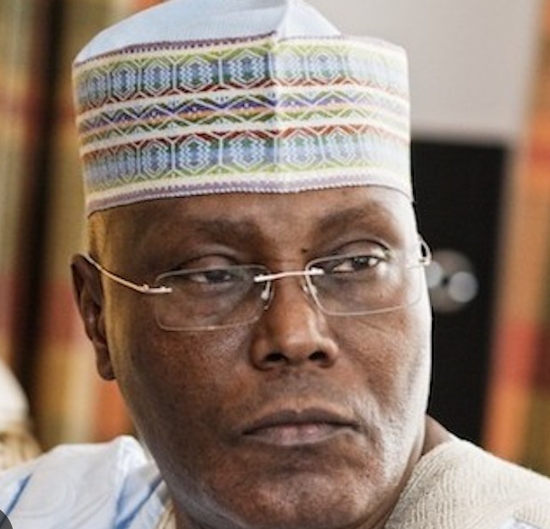News
Just in: Anambra pulls out from suit seeking to declare EFCC illegal

The Anambra State Government, on Tuesday, announced its decision to withdraw from the suit that is seeking to declare the operations of the Economic and Financial Crimes Commission, EFCC, illegal.
The state, through its Attorney General, Prof. Sylvia Ifemeje, told the Supreme Court that it was no longer willing to be a part of the legal action that was originally instituted by Kogi state.
The withdrawal notice was dated October 20.
Anambra took the position on a day that Osun state, through its Attorney-General, Mr. Oluwole Bada, applied to be allowed to consolidate its grievance against the operations of the EFCC, with that of Kogi state.
Osun state told a seven-man panel of the apex court led by Justice Uwani Abba-Aji, that it is seeking the same reliefs that Kogi state listed against the EFCC.
Whereas Sokoto state, which was earlier joined as a co-plaintiff in the matter, did not send any legal representative at the resumed proceeding on Tuesday, other states that announced their appearances, were; Kogi, Kebbi, Katsina, Jigawa, Oyo, Benue, Plateau, Cross River, Ondo, Niger, Edo and Bauchi.
Others were; Adamawa, Taraba, Ebonyi, Imo and Nasarawa.
The Attorney-General of the Federation and Minister of Justice, Prince Lateef Fagbemi, SAN, appeared as the sole defendant in the matter.
The AGF did not oppose Anambra state’s request to pull out of the case.
It will be recalled that 16 states of the federation had approached the Supreme Court to challenge the operations of the EFCC.
The states are contending that the anti-graft agency was not validly established by the then administration of President Olusegun Obasanjo.
It will be recalled that the EFCC was established by an Act of the National Assembly on December 12, 2002, by Obasanjo’s administration.
Following the appointment and confirmation of its pioneer Executive Chairman, Mallam Nuhu Ribadu and other administrative officers, by the Senate, the Commission commenced its operational activities on April 13, 2003, though its Establishment Act was later amended in 2004.
However, in the suit before the apex court, the states, through their respective Attorneys General, argued that section 12 of the 1999 Constitution, as amended, was not complied with before the EFCC began its operations.
According to the plaintiffs, it was a mandatory provision of the Constitution that majority of the Houses of Assembly of States must vote and agree to the passage of the EFCC Act, insisting that it was not something that only the National Assembly was legally allowed to do.
They told the Supreme Court that none of the states was carried along before the EFCC was established by the then President Obasanjo’s administration.
They argued that the Supreme Court had in a decided case-law in Dr. Joseph Nwobike Vs Federal Republic of Nigeria, held that it was a United Nation Convention against corruption that was reduced into the EFCC Establishment Act and that in enacting this law in 2004, the provision of Section 12 of the 1999 Constitution, as amended, was not followed.
The plaintiffs maintained that since the due process was not followed before the EFCC Establishment Act was enacted, it cannot be applicable in states that never approved of it, in accordance with provisions of the 1999 Constitution, as amended.
They argued that any agency that was formed as a result of the Act, ought to be regarded as an illegal institution.
The 16 states are relying on the fact that since the 1999 Constitution, as amended, is the supreme law of the land, any Act of the National Assembly that is inconsistent with the Constitution, ought to be declared a nullity.
Kogi state had specifically raised six questions for the apex court to determine, even as it sought nine principal reliefs.
It, among other things, prayed the Supreme Court for: “A declaration that the Economic and Financial Crimes Commission (EFCC), the Nigerian Financial Intelligence Unit (NFIU) or any agency of the Federal Government of Nigeria cannot investigate, requisition documents, invite and or arrest anyone with respect to offences arising from or touching on the administration and management of funds belonging to Kogi state of Nigeria or any Local Government Area of Kogi State.”
As well as: “A declaration that the Federal Government of Nigeria, through the Nigerian Financial Intelligence Unit (NFIU) or any agency of the Federal Government, lacks the power to issue any directive, guideline, advisory or any instrument howsoever called for the administration and management of funds belonging to Kogi State of Nigeria or any Local Government Area of Kogi state.”
News
Kill your 2027 election, PDP, LP chieftains advise Atiku

By Kayode Sanni-Arewa
A member of the National Executive Committee of the Peoples Democratic Party, Diran Odeyemi, and a chieftain of the Labour Party, Anslem Eragbe, have advised former Vice President Atiku Abubakar to kill his 2027 presidential election ambition.
Both Odeyemi and Eragbe said the South should be allowed to rule for eight years.
They said the 2027 southern president might not necessarily be President Bola Tinubu.
Eragbe, in an interview with Sunday PUNCH, argued that Atiku should not have contested the 2023 presidential election because it was the turn of the South to produce a president.
He said, “Atiku was not supposed to contest the 2023 presidential election because it was the turn of southern Nigeria. It is the turn of the South till 2031.
“Being a former Vice President of Nigeria for eight years; Atiku knows Nigeria’s power drill and equation. He should support younger Nigerians to power and provide guidance in 2027.”
Asked if the former Vice President would breach any law if he chooses to run for the nation’s highest office in 2027, Eragbe said the PDP stalwart “is entitled to his ambition and aspirations, adding however that “2027 – 2031 is for southern Nigeria.”
According to him, the 2027 presidency shall remain in southern Nigeria and should be zoned to the South-South region.
“It should be further micro-zoned to the (defunct) mid-Western region. I mean the defunct Bendel, now Edo and Delta states. We expect the major political parties to do this for equity, justice, fairness and parity.
“However, should President Bola Tinubu, win the 2027 presidential election and continue till 2031, power shall return to Northern Nigeria,” he added.
The former President of the Student Union Government of Ahmadu Bello University, Zaria, added that when compared with other geo-political zones in the country, the South-South had spent the least number of years on the presidential seat.
“The region that has ruled the least in Nigeria is the South-South with only five years under Goodluck Jonathan and should rule Nigeria again beginning from 2027.
“When put together, the North-Central spent a total of 17 years and 11 months, North-West, 17 years, three months; North-East, 10 years, three months; South-West, 15 years, four months by the time Tinubu finishes his term in May 2027; South East spent five years and nine months and the South-South, the only region to spend five years only on the presidential seat,” he added.
Eragbe called on the political parties to identify credible politicians, regardless of their financial status, to fly their flags for the various elective offices, stressing that 2027 would be another opportunity to right the wrongs of the past.
Speaking with Sunday PUNCH, Odeyemi stated that the ex-vice president’s participation in the 2023 presidential election and his perceived ambitions for 2027 were the causes of PDP crisis.
He charged Atiku to bury his ambition, adding that once the former vice president failed to declare interest in 2027, the crisis in the party would be over.
The 2023 election was originally supposed to be between southerners, as former President Muhammadu Buhari, a northerner, had just completed eight years in office. However, Atiku insisted on exercising his rights, which is why there is a crisis in the PDP,” he stated.
News
Why Buhari govt was shoved aside – IBB

By Kayode Sanni-Arewa
Ex-military head of state, Ibrahim Badamasi Babangida (IBB), has stated that he shoved aside Muhammadu Buhari’s regime because he believed his policies were detrimental to the nation’s progress.
The former military leader disclosed this in his autobiography, ‘A Journey In Service’, launched in Abuja on Thursday.
Babangida was chief of staff to Buhari, who ousted Shehu Shagari’s civilian government in the December 31, 1983 coup.
After the military coup that replaced the civilian government of Shehu Shagari with a military regime led by Major General Muhammadu Buhari, Ibrahim Babangida assumed the Chief of Army Staff role.
However, he became increasingly dissatisfied with the Buhari government’s policies and leadership style, which he described as draconian.
Recalling how he journeyed from Minna to Lagos on August 27, 1985, to assume office, Babangida said tension had already begun to build up since the start of the year, and a change in leadership had become necessary.
He said, “On that day, it became my lot to step into the saddle of national leadership on behalf of the Nigerian armed forces. The change in leadership had become necessary as a response to the worsening mood of the nation and growing concern about our future as a people. All through the previous day, as we flew from Minna and drove through Lagos towards Bonny Camp, I was deeply reflecting on how we as a nation got to this point and how and why I found myself at this juncture of fate.
“By the beginning of 1985, the citizenry had become apprehensive about the future of our country.
The atmosphere was precarious and fraught with ominous signs of clear and present danger. It was clear to the more discerning leadership of the armed forces that our initial rescue mission of 1983 had largely miscarried. We now stood the risk of having the armed forces split down the line because our rescue mission had largely derailed. If the armed forces imploded, the nation would go with it, and the end was just too frightening to contemplate.
“Divisions of opinion within the armed forces had come to replace the unanimity of purpose that informed the December 1983 change of government. In state affairs, the armed forces, as the only remaining institution of national cohesion, were becoming torn into factions; something needed to be done lest we lose the nation itself. My greatest fear was that division of opinion and views within the armed forces could lead to factionalisation in the military. If allowed to continue and gain root, grave dangers lay ahead.”
News
How CBN Spent $8bn On Naira Defence Against Dollar At FX Market

By Kayode Sanni-Arewa
The Chief Executive Officer of Financial Derivatives, Bismark Rewane, has revealed that the Nigerian government, through the Central Bank of Nigeria, has spent almost $8 billion defending the naira at the foreign exchange market in the last months.
Rewane, a renowned economist, disclosed this at the weekend in an interview with Channels Television.
He was reacting to the decision by the Monetary Policy Committee to retain the country’s interest rate at 27.50 percent at the same time, maintaining other MPR parameters.
Explaining the reason the Naira has appreciated to N1,505 and N1,507 across parallel and official foreign exchange markets, he noted that the apex bank has several initiatives to support the country’s currency.
“We’ve also borrowed $4 billion in bond issues. When you take a look at that, you’ll see there is a lot of work. We’ve actually spent almost $8 billion trying to support the naira at current levels,” Rewane stated.
According to him, Nigeria’s January inflation figure, which dropped to 24.48 percent after the Consumer Price Index rebasing, does not reflect the reality of ordinary Nigerians.
“There’s no way that inflation can reduce by 10% in a short period. The man on the street does not believe that inflation has come down as sharply as that,” he said.
-

 News18 hours ago
News18 hours agoJust in : Senator Gumau is dead
-

 News19 hours ago
News19 hours ago10th NASS Committed to Constitutional Reforms – Kalu
-

 News19 hours ago
News19 hours agoRep Salam Congratulates Governor Adeleke On Successful Conduct Of LG Elections
-

 Metro11 hours ago
Metro11 hours agoInsecurity! Gunmen invade church, slash pastor’s 2 fingers
-

 Metro11 hours ago
Metro11 hours agoFire engulfs MTN office in Oyo
-

 News18 hours ago
News18 hours agoI have never insulted President Tinubu in my entire life”-Gov Adeleke
-

 News18 hours ago
News18 hours agoPolice seal OSSIEC office, officials nabbed, says chairman
-

 Politics17 hours ago
Politics17 hours agoWike excited as Orbih is re-elected PDP S/South Chairman







